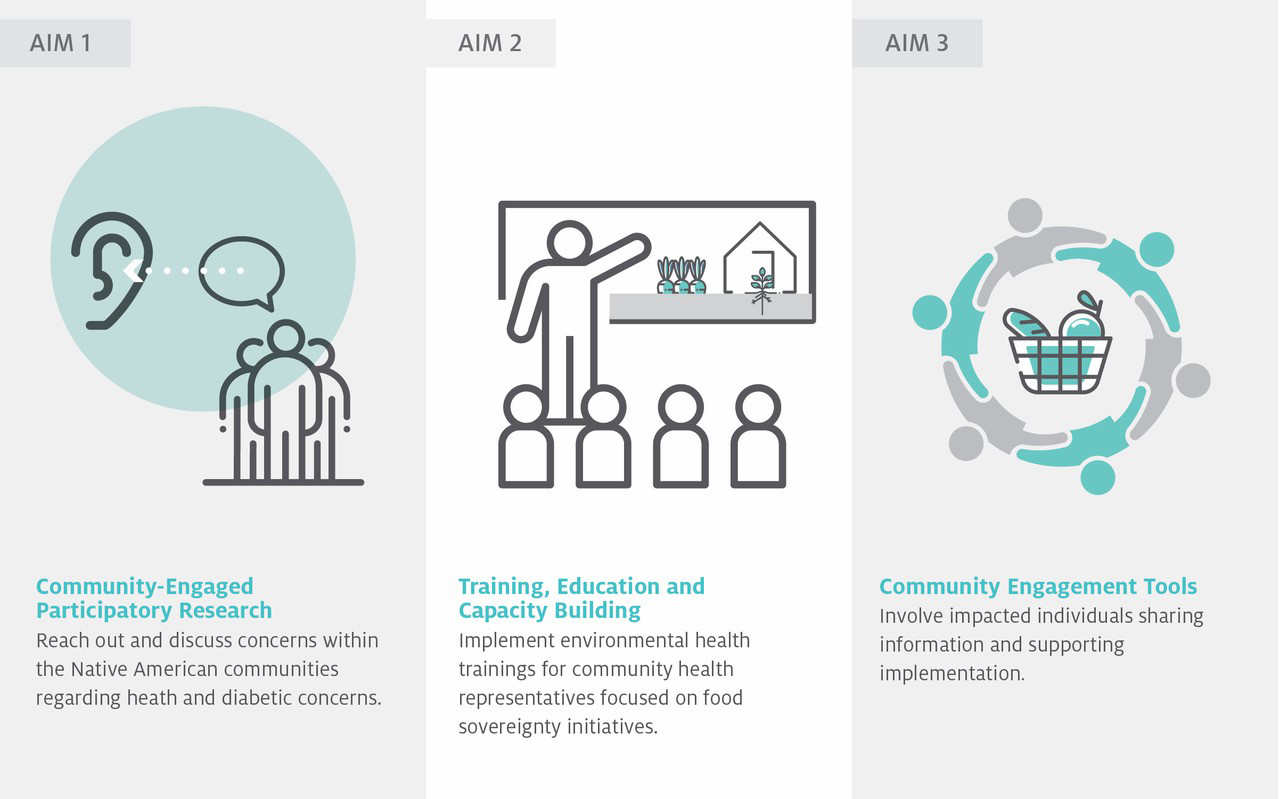Community Engagement Core: Tribal-University Partnerships
Core Leaders
Principal Investigator
Co-Investigator
Center Director, Co-Investigator
Summary
The University of Arizona Superfund Research Center (UA SRC) has successfully translated research findings focused on the health and environmental impacts of mining on vulnerable communities and has engaged affected citizens to reduce and mitigate exposure through learning modules, outreach activities, workshops, capacity building, and developing community-engaged participatory research. The UA SRC Community Engagement Core (CEC) continues to engage Native American communities and tribal colleges and universities in the Southwest that are located adjacent to mining sites by building and expanding upon previously nurtured partnerships, including the Tohono O'odham Nation, Tohono O'odham Community College, the Navajo Nation, Diné College, and Navajo Community Health Representatives. The goal of the current UA SRC CEC is to specifically focus on community engagement with Native Americans living near mining sites, as these communities are disproportionately impacted by mining and arsenic-contaminated water, resulting in increased exposure to arsenic and higher rates of diabetes, particularly uncontrolled diabetes. Supported by the Data Management and Analysis Core and the Administrative Core and working closely with the Research Experience and Training Coordination Core, the CEC ensures community-engaged participatory research, training, education and capacity building through the development of community-engaged tools centered on a solutions-based approach to indigenous food sovereignty as a means to minimize and mitigate the increased risk of diabetes. Food sovereignty efforts are developing and exist in many tribal communities; however, the connection to arsenic in water as a result of mining and increased risks to diabetes is lacking. Using findings from the UA SRC research projects, the CEC is engaging in multilateral communications with key stakeholders. Specifically, the CEC is instrumental in innovatively engaging tribal communities in a manner that takes cultural values and traditions into consideration (in an indigenous-centric manner) and provides training, education, and capacity building to maintain food sovereignty and decrease the risks of arsenic exposure. By empowering tribal communities to take local action to mitigate and minimize these impacts in a more sustained manner, the approach of the UA SRC CEC is truly bilateral. Finally, the UA SRC CEC engages tribal partners in the research process to increase understanding of environmental and health risks of mining and arsenic-contaminated waters that lead to increased risks for diabetes. Most critically, the CEC engages in mitigation approaches to reduce and minimize risks to vulnerable Native American populations. Engagement with tribal communities increases awareness of risks and best practices in ways that honor tribal sovereignty and knowledge and aid in cultural understanding while reducing racial misconceptions and fostering university-community partnerships based on trust and transparency.
Videos:
- Breakthrough: Bitter Water - A film by Science Friday Produced in collaboration with the Howard Hughes Medical Institute
- Indigenous Resilience Center- Advancing Community-Driven Solutions- A conversation between Dr. Robbins and Dr. Karletta Chief (Diné), Associate Professor and Extension Specialist in the Department of Environmental Science, University Distinguished Outreach Faculty, and Director of the new Indigenous Resilience Center (IRC).
In the News:
- UArizona Launches Center to Advance Resilience of Native Nations, Address Environmental Challenges - UA News Article, September 2021
- Partnerships for a Better Future - Story by Arizona Alumni Magazine, Spring 2022
- What is Next in Partnering with Tribal Leaders - Story by Arizona Alumni Magazine, Spring 2022
- Karletta Chief, Ph.D. – Partnering with Tribal Communities to Protect Water from Pollution and Climate Change - NIEHS Grantee Highlight, May 24, 2022


